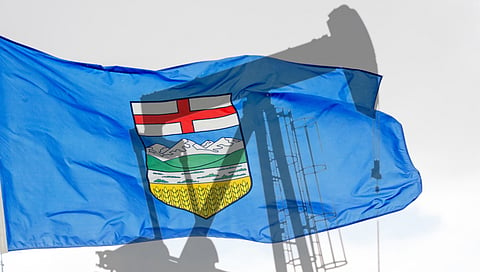

Surprise, surprise. Green groups and left wing media outlets are crying foul over Trump’s lower oil and gas tariffs — and who should pay for them.
Predictably, Canada’s coalition of loonie-left environmental and social groups want Ottawa to either impose punitive excise taxes on Canadian oil and gas production and redistribute the money back to other sectors of the economy or turn off the taps altogether.
The National Observer accused oil and gas companies in cooperation with Alberta Premier Danielle Smith's — successful — attempts to lobby the US president for lower tariff rates of being engaged in a “near-treasonous effort to undermine a united Canadian response.”
About the only thing the two sides can agree on is that the tariffs are “reckless” and unwarranted, according to a statement by the Canadian Labour Congress (CLC). That almost exactly paralleled comments by Opposition Leader Pierre Poilievre at a press conference in Vancouver this morning, who called the tariffs “reckless and wrong.”
But how to deal with them is where they differed, with the radical environmentalists advocating extreme positions, ranging from export taxes to turning off the oil taps outright.
To wit: the Climate Action Network issued a statement calling on Ottawa to impose an arbitrary 25% export tax and redistribute the funds back to unspecified “workers and their communities.”
According to the Canadian Centre for Policy Alternatives, such a tax would effectively hand over $40 billion per year — from Alberta — that Ottawa could use to “offset the costs Canada and the provinces would incur to manage the economic shock.”
“Applying a similar tax to Canadian exports of uranium, potash, natural gas and perhaps aluminum could raise billions more while straining corporate profits in the US,” it added.
Likewise, the CLC called for Ottawa to “cut off US energy and resources NOW.”
“The United States must feel immediate pain for their actions aimed at harming the Canadian economy and its workers,” CLC president Bea Bruske said in a statement on Saturday.
That’s notwithstanding the fact that almost all of the Alberta oil consumed in Ontario and Quebec is reimported from Thunder Bay via Enbridge’s Line 5 through Michigan. Which means Canadians would be collateral damage to such an extreme reaction.
Alberta’s Smith has argued such knee-jerk actions would only further damage Canada’s economic prospects while irrevocably damaging its relationship what still is — and will be — the country’s largest trading partner long after Trump is gone.
That fails to mention the threat to the national fabric of this country itself. Far from strengthening Canada’s sovereignty, pitting one region of the country against the others is a sure-fire way to drive them into the arms of Trump’s vision of Canada as a 51st state.
Smith has already warned that unilaterally imposing an oil export tax would spark a full-blown national unity crisis.
The idea of using onerous export taxes to fight tariffs is built on the assumption that most of the oil and gas industry is largely American owned. In fact, that hasn’t been the case since the first Trudeau was in charge.
With the final formal exit of Shell from the Albian oil sands mine near Fort McMurray last week, Canadian ownership of the oil sands stood in excess of 77% according to Oil Sands Magazine. American companies held just 14% as of the first quarter of 2022, while Asian companies in China and Korea held most of the rest.
A good chunk is indirectly owned by Canadian pension plans and retirement funds in addition to retail investors.
In other words, any moves to penalize the oil industry would disproportionately hurt Canadians living in all parts of the country, not just Alberta. And while there are effective and practical measures Alberta can take to respond to the tariffs, export taxes aren’t one of them.
For instance, successive governments in Alberta have curtailed production to prop up prices due to widening light/heavy oil differentials and it could do so now to offset an equivalent amount of revenue lost from the tariffs.
Another less popular move would be for Ottawa to dramatically devalue the Canadian dollar by 25% to make Canadian exports that much cheaper. But that risks fuelling inflation and further deepening an affordability crisis on basic items like food and groceries.
In essence, it would be a massive poison pill that would devalue the country’s shares — its currency — and make it essentially worthless.
Which is what Trump really wants in the first place. Caveat Emptor.
